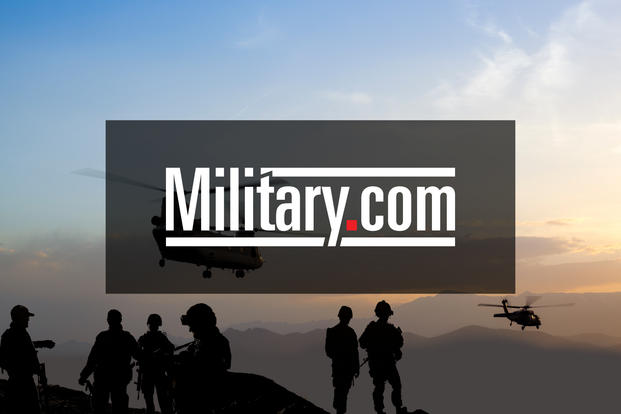The Republican presidential candidate Donald Trump and his Democratic opponent Hillary Clinton on Wednesday clashed over issues ranging from the Islamic State to Russia to guns.
The candidates met on Wednesday evening in Las Vegas for their third and final 90-minute debate, which was hosted by Fox News anchor Chris Wallace.
While many of the headlines immediately following the forum focused on Trump's comments that suggested he may not accept the election results if he lost -- "I will keep you in suspense," he said -- the candidates touched on military matters during yet another contentious debate.
Indeed, they wasted little time staking out different positions on a number of issues, from the kind of justice they would like to see serve on the nine-member Supreme Court, which has a vacancy after Antonin Scalia died in February, to the fight against the Islamic State in Iraq and Syria, or ISIS.
ISIS
When pressed by Wallace, neither candidate said they would seek to deploy U.S. ground troops in Iraq to hold territory retaken from ISIS militants. There are roughly 5,000 American service members already serving in the country.
Clinton said she was "encouraged" by the military operation currently underway by Iraqi and Kurdish forces, with support from U.S. troops armed with such weapons such as AH-64 Apache gunships, to retake Mosul. Iraq's second-largest city was overrun by ISIS in June 2014.
"I will not support putting American soldiers into Iraq as an occupying force," Clinton said. Such as move would serve as a "red flag" for militants to reconstitute themselves there, she said. Like during the first debate, Clinton also said she would target the group's leadership.
Trump criticized Clinton and President Barack Obama for "losing" Mosul following the 2011 withdrawal of U.S. troops from Iraq. He also criticized U.S. officials for speaking about the offensive beforehand -- "whatever happened to the element of surprise?" he said -- and, in an aside, said the operation is politically motivated.
"The only reason they did it is because she's running for office of president and they want to look tough," he said.
Clinton responded, "I'm just amazed that he seems to think that the Iraqi government and our allies and everybody else launched the attack on Mosul to help me in this election."
Russia
An even more contentious exchange came when the candidates discussed Russian President Vladimir Putin.
Trump said the Russian leader "has no respect" for Clinton.
Clinton replied, "Well that's because he'd rather have a puppet as president of the United States."
Trump said, "You're the puppet."
Clinton said she found it "deeply disturbing" that 17 U.S. civilian and defense agencies concluded recent cyberattacks against her campaign and the Democratic National Committee were launched from "the highest levels of the Kremlin" and were "designed to influence our election."
Trump said he doesn't condone the attacks. "I don't know Putin," the candidate said, later adding, "This is not my best friend." But, echoing previous criticism, he slammed Clinton for using a private email system to send classified messages while secretary of state.
He blasted the Clinton Foundation as "a criminal enterprise" for taking millions of dollars from such countries as Saudi Arabia with poor records on human rights. When pressed by Wallace on the organization's alleged "pay to play" practices, Clinton didn't address the matter.
Trump also referenced the case of retired Marine Gen. James Cartwright, former vice chairman of the Joint Chiefs of Staff, who, the Associated Press reported, may face imprisonment after pleading guilty to making false statements during an investigation into a leak of classified information about a covert cyberattack on an Iranian nuclear facility. "One lie," Trump said of the four-star general. "She's lied."
On Syria, where the U.S. and Russia support opposing forces engaged in a bloody, five-year-old civil war, Clinton said the country "will remain a hotbed of terrorism" as long as the conflict continues, but she repeated her pledge to continue U.S. airstrikes to rout ISIS from Raqqa, the group's self-proclaimed capital.
Trump, after splitting from his running mate Mike Pence on what course the U.S. should take in Syria, said Syrian President Bashar al-Assad has aligned with Iran and Russia in the conflict to preserve power and was "much tougher and much smarter" than Clinton and Obama.
Guns
Trump said the Second Amendment, which guarantees citizens the right to bear arms, is "under absolute siege." He warned that if Clinton were elected president, the constitutional protection "will be a very, very small replica of what it is right now."
Clinton said she supports the amendment, but "there can be and must be reasonable regulation," given the roughly 33,000 firearm-related deaths that occur in the U.S. each year. She called for "complete background checks" on would-be gun owners, and for closing loopholes related to buying firearms online and at gun shows.
Clinton also said she opposed the Supreme Court's decision in the 2008 case, "District of Columbia v. Heller," in which the justices ruled 5-4 in support of an individual's right to own a gun for personal use. Clinton said the district "was trying to protect toddlers from guns." The plaintiff in the case was Dick Anthony Heller, a security guard who had been denied a license to keep his gun at home.
The rise in mass shootings across the country, including at military sites from Fort Hood, Texas, to Chattanooga, Tennessee, has prompted some lawmakers to call for letting more service members carry concealed weapon on base. Leaders such as Army Chief of Staff Gen. Mark Milley have opposed the idea.
Clinton also repeated her pledge to prevent individuals on the do-not fly list from acquiring firearms. "If you're too dangerous to fly, you're too dangerous to buy a gun," she said. The Senate in June voted against a proposal to bar gun sales to terrorism suspects.
-- Brendan McGarry can be reached at brendan.mcgarry@military.com. Follow him on Twitter at @Brendan_McGarry.




























